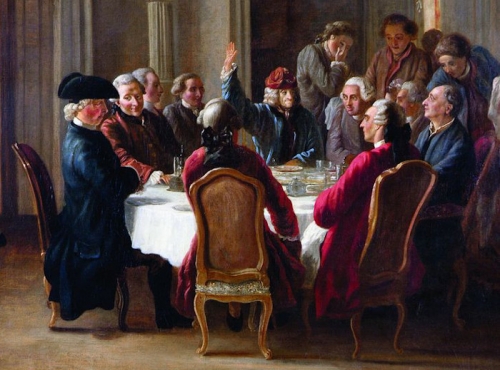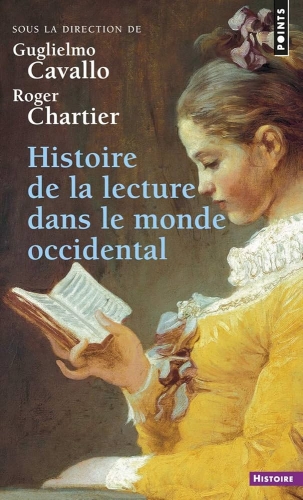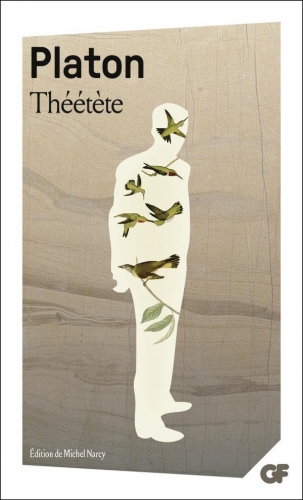lundi, 29 septembre 2025
L'intelligence est-elle soluble dans la modernité vagissante?

11:57 Publié dans Philosophie | Lien permanent | Commentaires (0) | Tags : philosophie, lecture |  |
|  del.icio.us |
del.icio.us |  |
|  Digg |
Digg | ![]() Facebook
Facebook
lundi, 21 avril 2025
De la difficulté de converser

De la difficulté de converser
Claude Bourrinet
Source: https://www.facebook.com/profile.php?id=100002364487528
Lorsque je parcours les Journaux intimes de certains écrivains ou membres d'une certaine mondanité, laquelle s'étale des couches supérieures de la moyenne bourgeoisie à l'aristocratie engrossée par la bourgeoisie d'argent (un pléonasme?) - je ne citerai pas de noms : je possède plusieurs rayons de ma bibliothèque qui entassent ce type d'écrits intimes, dont je raffole, car ils collent à la réalité existentielle, et sont tissés par un style vivant, qui, souvent tressaille encore d'énergie tendue par l'urgence d'un présent, qu'il est plaisant de ressusciter) – je m'aperçois que ce que j'ai eu de la peine à ambitionner, à savoir me couler dans un milieu où le commerce culturel est si habituel que l'on n'y fait même plus attention, comme l'air qu'on respire, itinéraire pavé d'obstacles douloureux, car je venais d'un milieu misérable, à tous points de vue, était pour ainsi dire un privilège de naissance. Il est un monde où l'on baigne, dès les premiers jours, dans la lumière éveilleuse de la belle langue, du vocabulaire riche et précis, de l'esprit et de la curiosité. Tel ne fut pas mon lot.
Grâce à la politique – c'est peut-être là l'un de ses rares mérites, hélas vite étouffé par l'esprit missionnaire, la mécanique catéchistique, et la muflerie militante – il me fut malgré tout donné de flirter avec des êtres intelligents, du moins assez cultivés pour m'ouvrir largement des horizons exaltants.
On a de la peine, après les temps éradicateurs qui ont réduit le champ de la véritable culture, celle qui s'inspire des grands créateurs de la littérature, de l'art, de la musique, de la science etc. à ce qui subsiste maintenant, ces friselis boueux qui agitent le monde médiatique et suscitent quelques bulles d'exaltation morne dans les cerveaux vidés de la société marchande, à saisir ce qu'était cette ébullition un peu anarchique des années 60-70. Pour un jeune fils de prolo, dont le milieu familial était un désert culturel, et dont pas un membre, dans un cercle très large, n'était allé plus loin que le brevet, accéder à l'univers du livre était une libération – et cette fois-là, ce n'était pas un vain slogan. Je me suis donc plongé, avec gourmandise, dans tous les ouvrages théoriques ou historiques de la doxa trotskiste (et il faut être honnête en lui reconnaissant une haute teneur abstraite et érudite), en même temps que dans toute l’œuvre de Dostoïevski, dans Les Confessions de Saint Augustin, ET de Rousseau, etc., et cela au plus bel âge de la vie, vers 16-17 ans.
Il est nécessaire de bien imaginer, concrètement, ce qui peut se dérouler dans un cerveau qui n'a jamais connu que le vide, et que l'on nourrit tout à coup d'une nourriture dont il avait le pressentiment, et à laquelle il aspirait au plus profond de l'être, sans en avoir conscience. J'étais comme Perceval le sauvage, découvrant, ébloui, l'armure étincelante de chevaliers qu'il prend pour des anges.

On perd cette avidité en se bourrant de bouquins. Il m'arrive de regretter ce temps où chaque lecture était une aventure, où je mettais ma vie sur la table. C'était comme ce souffle d'air printanier qui défrise la chevelure, dont parle souvent les surréalistes. Du reste, le surréalisme, la poésie, étaient notre pain de ce jour. Nous aimions l'art, les livres émancipés. Nous étions peut-être un peu partiaux, en rejetant de larges pans de la culture classique, que j'ai appris à découvrir. Mais peut-être faut-il passer par la subversion, pour comprendre le « conformisme » (qui, de là, n'est plus si « conformiste », puisqu'on est alors capable de saisir, chez un Racine, un Tacite, un Balzac, etc., ce que les Anciens portaient d'originalité qui dérangeait).
Du moins ai-je appris que la véritable culture doit passer par une remise en question perpétuelle, et j'entends le vocable « question » au sens le plus atroce, celui de « torture ». Contrairement à un prêt-à-penser hédoniste de fainéants, la vraie lecture n'est pas un délassement, un « plaisir » aussi léger qu'une caresse (surtout quand on y mêle l'érotisme). Il faut être masochiste pour CONTINUER à lire, car on y frôle l'abîme, si l'on prend ce funambulisme au sérieux. Et rien de grand (et la grandeur peut se suffire elle-même, sans être rendu publique. «Avant tout, être un grand homme et un saint pour soi-même », écrit Baudelaire) ne s'effectue sans souffrance. Que ce soit dans l'ordre de l'intelligence, ou dans celui de l'amour.
Pourtant, je n'ai jamais réussi à être à l'aise dans ce milieu, où j'étais parvenu à me hisser. L'origine sociale colle à la semelle des savates, et mes réflexes d'humilié m'interdisait l'égalité. Il me fallait être, soit supérieur, soit inférieur. J'ai préféré l'exil. Le combat contre autrui m'épuise, et je crève de lutter contre moi-même, ce qui est largement suffisant.
Je m'aperçois, à la fin de ce lamento, que je voulais évoquer une chose (l'urgence du Salut), et que j'ai dérivé vers un autre propos. Voilà ce que c'est, que parler à son bonnet !
14:54 Publié dans Réflexions personnelles | Lien permanent | Commentaires (0) | Tags : lecture, conversation, réflexions personnelles, claude bourrinet |  |
|  del.icio.us |
del.icio.us |  |
|  Digg |
Digg | ![]() Facebook
Facebook
lundi, 31 mars 2025
La lecture, une aliénation , ou une libération ?

La lecture, une aliénation, ou une libération?
Claude Bourrinet
Comment expliquer la sensation d’être « pris » par un livre comme dans le filet de Circé, l’impression d’échapper au temps vernaculaire, de ne plus penser que par truchement, d’être quasiment manipulé, voire conditionné ? Comment comprendre le rapport érotique assez fréquent entre l’auteur et le lecteur (très souvent la lectrice) instaurant entre eux, parfois, une démarche de séduction et des rapports amoureux très concrets ? Cela s’est vu avec les plus grands, et je ne citerai que Chateaubriand et ses nombreuses conquêtes, ou bien, pour faire bonne mesure, Gide et ses gitons lettrés. La « possession » générée par la lecture présente aussi de belles incarnations, fussent-elles nées de l’imagination romanesque, comme Don Quichotte et Emma Bovarysme.
Pourquoi les Grecs et les Romains se faisaient-ils lire les « rouleaux » de papyrus (les « volumen ») par des esclaves ? Pourquoi, d’ailleurs, lorsqu’ils étaient « auctores », comme Cicéron, dictaient-ils leurs textes ? Il faut bien que l’acte de lecture ait quelque chose à voir avec la conception de la liberté, qui ne pouvait être que civique, dans l’Antiquité.
Il faut donc, pour comprendre ce phénomène qui tient de la magie et de la manipulation (mais on sait que les deux domaines d’action sont parents) revenir à l’origine (du moins dans l’aire de notre civilisation).

En grec, il y a plusieurs manières de dire « lire ». Nous ne les passerons pas toutes en revue, mais nous retiendrons ce qui concerne les questions ci-dessus. Je me suis servi du livre incroyablement érudit, et collectif – sous la direction de Guglielmo Cavallo et de Roger Chartier : Histoire de la lecture dans le monde occidental, aux Éditions du Seuil.
En Grèce antique, la « voix » est première. Le héros quête le « kléos », le renom, par lequel il deviendra immortel, puisqu’il est « impérissable », autrement dit la « gloire » (en langue germanique, on a un mot de même racine, le « Laut » – peut-être ce mot a-t-il la même racine que "Laudes" (louanges à Dieu), mais je n’en suis pas sûr). Homère utilise le terme pour désigner sa poésie épique, qui fut longtemps une « performance » orale, avant d’être écrite. C’est par le kleos que le héros existe, donc, aussi, son monde. La voix est créatrice de monde, et elle est intimement dépendante de la mémoire. On devine bien que l’écrit rendra, à terme, vaine, cette mémoire, et étouffera la « voix ».
De même, sur les inscriptions lapidaires funéraires, le long des chemins, par exemple, le passant est invité à proférer ce qui y est inscrit, et à haute voix, pour donner corps (ou plutôt son) à la mémoire. C’est assurer un semblant d’immortalité au mort.
L’un des mots utilisés pour désigner l’acte de « lire » est « ananémesthai ». C’est un terme en dialecte ionien, à la forme moyenne, datant, en l’occurrence, ici, du 5ème siècle, trouvé sur une stèle funéraire d’un certain Mnésithéos, en Eubée. L’épitaphe commence ainsi : « Salut, ô passants ! Moi, je repose mort en dessous. Toi qui t’approches, lis (verbe : ananémesthai) qui est l’homme enterré ici : un étranger d’Egine, du nom de Mnésithéos »
Le verbe epinémein, à la forme active, qui signifie aussi « lire », a un sens de « distribuer », qui suppose un auditoire. Mais la forme moyenne ananémesthao signifie aussi « distribuer en s’incluant dans la distribution ».
L’écriture de la stèle est évidemment en scriptio continua, comme c’est le cas de tous les écrits de l’époque, jusqu’à la fin du Moyen Âge, du reste, c’est-à-dire qu’il n’y a pas d’intervalles entre les mots. Il faut lire à haute voix pour comprendre. L’« orateur » sert d’intermédiaire, et « traduit » en son ce qui lui est dicté par des signes graphiques. Il a un rôle passif-actif : il reçoit, mais doit restituer. Un autre mot pour « lire » est epilégesthai », qui signifie « ajouter un dire à ». Autrement dit, le « lecteur » ajoute sa voix à l’écrit, incomplet en lui-même.

Il s’agit bien sûr d’épeler les mots inscrits (d’où le verbe anagignoskein, qui veut dire « reconnaître », mais il ne s’agit pas simplement d’ânonner des mots, de décrypter parfois péniblement (en effet, les hommes libres de l’Antiquité se faisaient une vertu de ne connaître que les rudiments de la lecture, rougissant d’en savoir davantage, et laissant le soin d’en savoir davantage aux esclaves intelligents et aux philosophes – qui étaient parfois les mêmes). Mais « reconnaissance » signifie bien davantage. On peut « connaître ses lettres », tà grammata espistasthai » sans lire vraiment, c’est-à-dire sans souder les segments de la phrase ou du texte en un sens compréhensible par le lecteur et/ou l’auditoire. Il faut que le son se transforme en langage. Ainsi les signes alphabétiques se transforment-ils en stoikheia, en « éléments constitutifs du langage ».
On voit par là que la lecture (à voix haute) FAIT PARTIE DU TEXTE (sans elle, il n’existe pas). On peut dire la même chose de la lecture silencieuse. Le texte est un « tissu » (étymologie de « texte ») qui mêle intimement graphie et son (même intériorisé).
Or, on lit, sur une inscription dorienne : « Celui qui écrit ces mots enculera (pugixei) celui qui en fait la lecture. » Le lecteur est perçu comme un partenaire passif, comme le jeune garçon est l’instrument de plaisir de l’Éraste.
A Athènes, l’homme libre qui se prostituait, d’une façon ou d’une autre, s’il mettait les pieds dans l’agora, était immédiatement mis à mort. Le jeune garçon - à qui il était bienséant de ne manifester aucun penchant excessif à son rôle de partenaire, sexuel, au contraire : il se devait d'être "chaste", comme Socrate le conseillait à Alcibiade, dans Le Banquet - cessait d’être un instrument érotique lorsqu’il devenait un homme mûr, un guerrier et un citoyen.

Mais on voit bien avec quel mépris est considéré le lecteur. Sa fonction est de servir, de se soumettre, d'être un jouet. Dans le Théétète, Platon se sert d’un esclave « doué de voix » pour lire un texte. C’était un esclave d’Euclide. Savoir lire savamment et abondamment fait courir le risque – dans l’état d’alors de la lecture, nécessairement orale et publique – d’être assimilé à un esclave, dont la soumission est de nature.
D’autant plus que le texte est le maître, et que son instrument ne doit manifester qu’une vertu, la fidélité. La syntaxe, la grammaire ordonnent. Cette réflexion peut nous permettre, du reste, de comprendre ce que Barthes voulait dire, lorsqu’il proclamais, vers 1970, que la grammaire était « fasciste ». (En vérité, il a dit que la langue était fasciste, mais la grammaire est une vision structurée de la langue).
On a ainsi répondu, en partie peut-être, à la série de questions posées au début de ce texte.
Mais, bien évidemment, pour nous, grands lecteurs, membres d’une civilisation qui a présenté la lecture comme une qualité essentielle de l’« honnête homme » (ou femme), comme l’un des sommets de l’excellence humaine, la lecture nous paraît plutôt comme une voie de libération (sans pour cela que la dimension originelle, de soumission érotisante, ait disparu, on le sait bien).
Il me semble que cette vocation à la liberté vient de la Bible, Livre saint, dont la lecture traduit en mots humain le Verbe de Dieu. A ce titre, tout acte de lecture met au jour les arcanes du monde, et par elle souffle l’Esprit, où Il veut, et est le germe de la Vérité, le levain qui nous fait renaître à la vraie vie.
17:26 Publié dans Philosophie | Lien permanent | Commentaires (0) | Tags : philosophie, lecture, grèce antique, antiquité grecque |  |
|  del.icio.us |
del.icio.us |  |
|  Digg |
Digg | ![]() Facebook
Facebook
lundi, 22 février 2016
The Need to Read Better!

The Need to Read Better!
By Linda Schrock Taylor
Ex: http://www.lewrockwell.com
In 1930, 3 million American adults could not read. Most of those 1 million white illiterates and 2 million black illiterates were people over age fifty who had never been to school. (Regna Lee Wood)
In 2003, 30 million American adults could not read. Most had been to school for many years. (70% of prison inmates could not read; 19% of high school graduates could not read) (Illiteracy Statistics)
In 2003, The U.S. Department of Education’s National Institute of Literacy completed a National Assessment of Adult Literacy (NAAL) and concluded:
NUMBER OF ADULTS IN EACH PROSE LITERACY LEVEL
Below Basic: 30 million adults (14% of population)
no more than the most simple and concrete literacy skills
Basic: 63 million adults (29% of population)
can perform simple and everyday literacy activities
Intermediate: 95 million adults (44% of population)
can perform moderately challenging literacy activities
Proficient: 28 million adults (13% of population)
can perform complex and challenging literacy activities
———————————————————————————————————————
It can safely be assumed that during the twelve (12) years since this shocking news was released, little has been done to slow the rate of decline in literacy levels, and next-to-nothing has been done to decrease the numbers of illiterates and functional illiterates. The cost of this ever-growing national disaster is heartbreakingly high, both for the compromised individuals and for the nation as a whole. NAAL’s definition of literacy: “The ability to use printed and written information to function in society, to achieve one’s goals, and to develop one’s knowledge and potential.” The noninstitutional population of adults and teens aged 16 and over (not seasonally adjusted) not in the workforce during January of 2016, was 95,051,000. One cannot help but wonder about a correlation between the 2016 unemployment figures and those 93,000,000 illiterates and functional illiterates counted by NAAL in 2003.
In January of 2015, Dr. Sandra Stotsky said that most US college freshmen read at 6-7 grade levels. The assigned reading selections in today’s public schools are written at such low reading levels that the students using those materials fail to develop the vocabulary base, reading fluency, and content reading experiences necessary to prepare them for college/university complex reading and thought processes. I observed the same problems when I taught freshmen reading and English classes at a state university in Michigan. The vast majority of my students read at a fifth-grade level when tested with reading materials written in the 1920s. The students were quite offended when informed of their actual reading levels. As they were provided with additional materials to read, they had to admit that, indeed, they could not read classic academic fare. They then became angry at their high school teachers for not expecting more of them. These students could not write about their readings, either. One Detroit student explained how he became an “A” composition student: “Almost no one turned in homework so just by writing something, anything, and turning it in, I was an A student.”
Such students, when faced with traditional academic standards and teacher expectations, flounder, drop out, fail to perform at their potential, waste tuition money and time, further compromising their lives and their value to America. If our best and brightest are costing America so dearly, consider the great numbers of compromised readers enrolled in remedial classes in middle and high schools; in community colleges, colleges, and even in universities. Consider the expenses for those of all ages receiving remedial help in classes for English as a second language. Count up the hundreds of millions of dollars spent supporting those who, because they cannot read so cannot or will not support themselves, depend on taxpayer dollars for housing, food, utilities, health care, as well as for child rearing costs for their offspring.
With great discouragement, consider the public and personal costs for those sitting in reform schools, jails, and prisons where inmates receive little academic remediation and cannot look for jobs or report to work; and think of the tens of millions of people who work in jobs far beneath their intellectual levels, earning incomes far beneath their value, all because of their inferior reading abilities.
If a count were to be made of all individuals whose lives are less valued and less valuable because their schools failed to teach them to read by using the correct method for a phonetic language, the total would probably reach 90% or more of the American population. As Don Potter recently reminded people, “Even if every school in America started teaching the alphabet code today and every child was taught to read well with phonics, that would not solve the massive problem of teen and adult illiteracy that we have on our hands now.”
I had no choice but to write a book to help adults and teens improve their reading levels…and thus their lives…because few educators will admit to the breadth of the problem, and fewer still have any idea how to go about solving it.
 Americans became a highly literate people beginning in Colonial times because the ability to read the Bible was encouraged and expected at all ages, five and above. Schooling was valued so a book like Noah Webster’s “Blue-Backed Speller” became a best seller found in nearly every home. Historically, for 3,500 years, countries with languages with alphabets have successfully taught their citizens to read by using sound-to-letter correspondence, i.e. phonics. But in 1929-30, John Dewey began training America’s elementary teachers to teach reading by the memorization of sight words. The abject failure of American schools to teach children to read began then and continues unabated to this day, even in the face of that appalling 2003 finding of 93,000,000 functional illiterates age 16 and over! THAT alone should have slapped both shame and sense into educators at all levels, from first-grade teachers through university teacher training professors, all across the nation. But it did not. How telling; how utterly shameful that they all were able to disregard the findings; to never look at themselves in any mirrors; and to continue doing what they have been doing since Dewey set them on the oh, so, erroneous path.
Americans became a highly literate people beginning in Colonial times because the ability to read the Bible was encouraged and expected at all ages, five and above. Schooling was valued so a book like Noah Webster’s “Blue-Backed Speller” became a best seller found in nearly every home. Historically, for 3,500 years, countries with languages with alphabets have successfully taught their citizens to read by using sound-to-letter correspondence, i.e. phonics. But in 1929-30, John Dewey began training America’s elementary teachers to teach reading by the memorization of sight words. The abject failure of American schools to teach children to read began then and continues unabated to this day, even in the face of that appalling 2003 finding of 93,000,000 functional illiterates age 16 and over! THAT alone should have slapped both shame and sense into educators at all levels, from first-grade teachers through university teacher training professors, all across the nation. But it did not. How telling; how utterly shameful that they all were able to disregard the findings; to never look at themselves in any mirrors; and to continue doing what they have been doing since Dewey set them on the oh, so, erroneous path.
Dewey had observed deaf children being taught to read by memorizing sight words on flash cards. Dewey erroneously inferred that if deaf children could learn to read using such a method, one could only imagine how well it would work for hearing children! “One could only imagine” was exactly right because neither deaf nor hearing children learn to read using sight word memorization. Deaf students, including my own brother, dependent upon flash card instruction, usually graduate from high school with, at best, a 3rd-grade reading level. American prisons are filled with individuals who read at or below a 3rd-grade level, 70% of whom do not read at all. In all probability, most individuals dependent on welfare read below a 3rd-grade level, if at all. My mother always maintained that “In today’s schools, the only children who learn to read well do so in spite of the curriculum and the instruction, not because of it!” She was so right.
Thomas Jefferson said, “Educate and inform the whole mass of the people…They are the only sure reliance for the preservation of our liberty.” I look about and see America on the downslide with our liberties being the first things to go over the proverbial cliff. Wise advice abounds but if only 13% of our voting-age citizens can read, evaluate, and act upon complex explanations and suggestions, it is no wonder that we are losing both our liberties and our country.
Both adults and teenagers need an easy, manageable way to improve their reading skills so they not only improve their own lives but also save our liberties in America and thus improve the lives us all.
With that goal foremost; with remedial instruction as my knowledge base; with my career spent teaching and tutoring teens and adults in schools, universities, even in jail, I set about planning a book of methodical, short, essential, incremental lessons that my target populations could handle alone or with the help of a friend, relative or tutor. The lessons first teach, then give practice in the use of those small parts of the “code” in which English is written down into print. Our teachers forget to explain that English has been written down in a Code, and our teachers also forget to tell us that in order to read English, we must first be taught to understand and use the different pieces of the Code. Instead, we are left to guess! We do pretty well when we only have to guess that an ‘f’ is used to represent the /f/ sound. But, oh, how we need someone to explain that the spelling ‘wr’ “is only used at the beginning of words which convey the concept of twisting”! I have a master’s degree in English and I never guessed that clue! Actually, I never even thought about the ‘wr’ situation until Dr. Joseph Stomberg taught it to me about ten years ago. (That was after I had been teaching for about 35 years, unfortunately.)
But we need not dwell on what we do not know. Just understand that the schools let us all down, then use my book to learn the aspects of English that you never learned. Your reading skills will be all the better for the new knowledge and the practice stories included in the book will improve reading speed and mental agility. A life improves when a person can read better!
The Best of Linda Schrock Taylor
Linda Schrock Taylor [send her mail] is a reading specialist, writer, and retired teacher. She is the author of Read Better! For Adults and Teens, a manual for those wanting to read better with greater ease and more efficiency. The book includes short important lessons for use of the code in which English is written, followed by 80 practice stories arranged incrementally, ranging in difficulty from mid-elementary through college levels, with graded scoring for charting progress. Linda is now writing Spell Better, her second in a series for teens and adults. Visit Linda’s website to see lesson samples: http://www.ReadWriteSpellBetter.com.
creativecommons.org
Previous article by Linda Schrock Taylor: Here’s How To Teach Reading
08:41 Publié dans Actualité, Ecole/Education, Sociologie | Lien permanent | Commentaires (0) | Tags : actualité, états-unis, école, enseignement, éducation, lecture, sociologie, pédagogie |  |
|  del.icio.us |
del.icio.us |  |
|  Digg |
Digg | ![]() Facebook
Facebook
samedi, 21 avril 2012
How to read

Ex: http://www.theoccidentalobserver.net/2012/04/how-to-read/#more-13624
How to read
Tom Sunic
It is far easier to reflect on the art of dating than on the art of reading. For a student in humanities the main concern must not be which author he needs to read and which one he needs to discard, but rather how to read and how to interpret the text. Before he flips open a book he must ask himself a question: Who will interpret this text? Over the last several decades the focus in the humanities has not been so much the substance of the author’s work, but rather the biased interpretation of his work. The egalitarian-multicultural “paradigm” in higher education still determines how an author is studied — and hence how he is being interpreted. Here is an example: Johan W. Goethe, the German classic writer of the late 18th and early 19th century had a glowing reception in literary circles in National–Socialist Germany, a glowing reception in the postwar Allied-occupied West Germany, and a glowing one during the same period of time in the Soviet-occupied East Germany. Each political regime interpreted Goethe’s texts in accordance with the dominant political ideas of the time. The same rule of (re)interpretation applies to all authors, regardless whether they are novelists, social scientists or legal scholars.
The Frankfurt School Program in Applied Brainwashing
For many White activists, or would-be college students in humanities, it is still hard to comprehend that since the fateful 1945 the academic program in the West has been subject to a drastic methodological overhaul, which in turn resulted in gigantic brainwashing of students. The steady removal of hundreds of politically incorrect titles from library shelves on the one hand and a radically new interpretation of the classics on the other, only added insult to injury. The notion of just vs. unjust, of beauty vs. ugliness, of crook vs. hero, of truth vs. lie, has been reversed, or rather, the meaning of those words changed in accordance with the dominant leftist-liberal aka “multicultural” teaching philosophy. Very early on, largely as a result of the Frankfurt School Program in Applied Brainwashing, the System managed to conflate the notion of academic integrity with the notion of “humanism.” Any attempt by critically minded professors to examine authors lying beyond the pale of the standard curriculum, was immediately branded as a criminal, fascist enterprise, worthy of penal sanctions, loss of tenure, and academic ostracism.
Today, the choice of appropriate literature by a humanities student, or for that matter by any White activist wishing to learn more about his cultural and racial heritage, is further aggravated by his often clumsy choice of methods. Yes, titans are in town — we know that — and there are only a few honest teachers left to teach the right ropes. Without teachers to guide them, many White nationalists are inclined to start gobbling up heavy literature on race, or they may immerse themselves in academic texts on Judaism, while neglecting the simple prose of their homegrown classics. For a young White student or an activist, the unguided plowing through difficult texts on race, without prior knowledge of some of the classics, will not produce sound results. Also, there may be a strong temptation to focus on racial differences, or even show anger at lower-IQ racial groups, or make tallies of WWII body counts. Sooner, rather than later, such an approach will get a White student into trouble.
The first step for a White student or an activist is to get acquainted with at least a few classics and chose a good roadmap when reading them. Only later on, when their message begins to sink in, will he be able to grasp the criminal motives of the main movers and shakers in the study of humanities in the university. For instance, in order to understand his instructor’s palaver about Karl Marx and his epoch, a student might be well advised to combine the instructor’s mandatory reading list with his own list of authors, such as novelists Charles Dickens or Honoré de Balzac. Both novelists lived during the same epoch as the sociologist Marx, yet both were far better in graphically describing the wretched conditions of workers in early capitalist France and England.
Naturally, Shakespeare always comes in handy, not just for those wishing to understand the timeless issue of human fickleness, treachery and vanity, but also for those wishing to get a first whiff of the world of Shylock and what Shylock thinks of himself and his chosen tribe:
Shylock: “I will buy with you, sell with you, talk with you, walk with you, and so following; but I will not eat with you,
drink with you, nor pray with you.” (I, iii)
Shakespeare’s The Merchant of Venice is an important work of literature today for students wishing to grasp the language of modern banksters and the meanings of new financial fraud originating at Goldman Sachs, or when the Fed’s “Helicopter Ben” Bernanke preaches “quantitative easing” in order to con the masses into illusions about new job openings. Endless promissory notes about monetary bonds between Antonio and Shylock did not work out, so Shylock demands from Antonio a pound of flesh cut out from his body. This must have been a Shakespearian form of “prime collateral.” The same procedure is finding its mirror image today in “subprime collateral,” or in the grand total of student loan debt which has reached $1 trillion in the USA today.
Shylock: You’ll ask me, why I rather choose to have
A weight of carrion flesh, than to receive
Three thousand ducats. I’ll not answer that. But say it is my humour. (IV,i).
And the list goes on. Reading the 18th-century French Enlightenment writer Voltaire and his passages on the religious intolerance of Jews and Christians is a much safer literature for starters than passing out Jew-baiting pamphlets, or yelling silly slogans “Sieg Heil!” or White Power!” In any case, these infantile exclamations are precisely what the enemy’s big ears want to hear. Students must be also careful with Cliffs Notes, as they often hide an oblique meta-message by a stray leftist or pederast interpreter who is smart enough to tamper, or worse, reinterpret the text in accordance with his/her sick hormones. A case in point is Friedrich Nietzsche, the great anti-egalitarian Western thinker whose texts were successfully hijacked by leftist scholars after WWII. A word of advice: always look a the name of the publisher and the pedigree of the commentator, or the name of the preface writer before starting to read the text of a classic.
Plain old novels, dramas and poetry by classic Western writers often reflect better the climate of the socioeconomic and racial environment of a given epoch than heavy handed texts in sociology or ravings by a political science teacher. Only later on can the reading of novels be supplanted by the reading of scholarly works on the subjects of liberalism, race and multiculturalism. By then, a student will be already all pruned up and equipped with the necessary conceptual weaponry for the better comprehension of the horrible world he lives in. My suggestion: The course “Literature and Politics”—of course, in an ideal college environment—should be a standard undergrad 101 course in the study of humanities. The beauty of reading novels is that they provide good conceptual tools for the better understanding not just of the world as it once was, but also as it now is.
Higher Education Fraud
Today’s courses in humanities all over the Western academia are mega-sessions in educational travesty and a waste of students’ time and money. Most college courses in the humanities are in criminal violation of the right of White student to critical thinking and free inquiry. Not that all contemporary professors in the humanities are bad. In fact most of them are just simple turncoats who toe the line of the dominant political myths and who will dump them once new political myths become trendy. More obsessed with their own egos than with the quality teaching, their classes must be structured along the mimicked verbiage on “the power of diversity.” There is no attempt to guide students through the rudimentary lessons of critical thinking; intellectual curiosity is completely left aside. The entire academic fauna — both in Europe and the USA — is made up of pathetic characters sporting fake smiles and indulging in promiscuous brownnosing of their superiors, with all of them being pathologically jealous of each other. Long ago, the so-called multiracial sensitivity training program turned the Western higher education into a grotesque entertainment industry, barring intelligent White students from any critical inquiry into the nature of the beliefs being foisted on them.
A half-decent White professor with a conservative background who wishes to bypass his compulsive neurosis of self-censorship must engage in the ritual of fawning upon the Jews. Or he must deliver occasional laudatory pep talks about the state of Israel. This is just about the only safe strategy to secure himself the miniscule perks available to “conservatives.”
On the opposite side of the teaching spectrum, for a high IQ White student, who possesses some vestiges of introspection, college courses represent emotional abuse — for which neither his teacher, nor the dean’s office, nor the upper government echelons are ever called to account. Such a situation cannot last forever.
In both Europe or the USA, the only way for a White student to survive the well-planned process of educational dumbing down and brainwashing is by setting up his own parallel niche of study in which he can read in peace the right literature. As long as he is in college he should play the game, bite the bullet, and put up with years of mental torture in an ambiance which bears the fraudulent logo of “the place of free academic research and free speech.”
In no way should a White college student ever attempt to wave revisionist literature in front of the noses of his classmates, or taunt his professor with a politically incorrect remark, let alone crack a racial joke in public. This will augur his immediate kiss of death and signal a violent foreclosure of his future professional life. Getting the degree must be his primary goal.
Just about the only advantage of going to college today is its protective symbolism of the degree. Surely, the termination of the prison-like 4-year college enclosure won’t deliver fame, money, or glory. But getting a BA, MA, or PhD and going against the academic consensus will eventually elicit tacit respect from the conformists (who must always show nothing but hatred in public). To be sure, a White student won’t learn a thing from his politically correct humanities professors, whose greatest intellectual achievements consist of working out the details of their pension plan rollovers.
White students and activists whose native tongue is English have an immense advantage over Whites in Europe. The best literature today in the humanities is available in English. Besides, US college libraries, including even small college libraries, are the best in the world. Why not take advantage of it? For a White would-be genius, or would-be writer from Russia, or Germany, or France, let alone for an intelligent young writer residing in some microscopic country in Central Europe, mastering all nuances of the English language is unavoidable if he has any intention of getting into the literary limelight. In any case most scholarly books on race, modernity, on liberal decadence, or on the Jewish question, are published in English. German self-consciousness was destroyed after WWII and along with it the German language, which, although being a very rich language, other than in Germany, is barely spoken in other parts of Europe. The gloire of France is passé and although there are good books published in French, especially in the field of the sociology of postmodernity, few White Americans or English nationalists will bother learning the French language. As a global lingua franca the American English has become the only and the best weapon for cultural battles on all fronts.
Dr. Tom Sunic (www.tomsunic.com) is a former professor, author and a board member of The American Third Position Party http://american3rdposition.com/
00:05 Publié dans Réflexions personnelles | Lien permanent | Commentaires (0) | Tags : tomislav sunic, lecture, livres |  |
|  del.icio.us |
del.icio.us |  |
|  Digg |
Digg | ![]() Facebook
Facebook
mardi, 22 septembre 2009
Retour au réel
Retour au réel

Nous vivons aujourd’hui dans un monde essentiellement virtuel. La distance matérielle entre les êtres demeure la même, mais la distance existentielle qui les sépare se creuse. Plus encore, c’est notre rapport lui-même au réel qui s’est fragilisé. Nous nous inquiétons de la montée des « simulacres », et nous nous prenons même parfois à douter du monde qui nous entoure. Ce que nous voyons à l’image, que ce soit sur les écrans de télévision, de cinéma ou d’ordinateur, a-t-il la même réalité à nos yeux que ce que nous voyons directement devant nous ? Rien n’est moins sûr. L’image distancie, et vide les choses de leur substance. Un homme qui meurt à l’écran ne nous touche pas de la même façon qu’un homme qui meurt dans nos bras.
Il ne tient qu’à nous, pourtant, d’utiliser les outils qui nous sont offerts à notre meilleur avantage. On ne se prive pas des bienfaits d’une invention sous prétexte qu’elle comporte aussi des méfaits. Si les fusils n’existaient pas, les morts seraient moins nombreux au cours des guerres ; mais dès lors que les fusils existent, pourquoi se battre avec de simples épées ?
Le mal causé par la virtualisation du monde peut être ainsi partiellement enrayé par le monde virtuel lui-même. Il n’est pas facile de penser seul ; alors pensons tous ensemble ! Mettons en commun nos idées, échangeons, instruisons-nous réciproquement. Utilisons l’Internet pour communiquer, et suscitons un partage d’idées qui redonnera du sens à nos tentatives isolées de réflexion. Ne soyons plus solitaires…
Les ventes de livres savants chutent depuis la fin des années 1970, même chez les enseignants du secondaire ou du supérieur, et malgré l’explosion du nombre d’étudiants à l’université. Les éditeurs indépendants voient leur audience limitée à des cercles de plus en plus restreints. Certains facteurs peuvent en partie expliquer ce phénomène, comme l’essor des nouvelles technologies, qui absorbent une grande partie du temps consacré par chaque citoyen à lire et s’informer. Mais le Web ne propose en général guère plus que des fragments de pensée, sur le mode du zapping. Nous voulons contribuer quant à nous, à notre niveau, à la restauration d’une pensée de fond, qui prenne le temps d’établir ses marques. Nous voulons lutter contre la superficialité d’une ère médiatique et numérique qui nous voue le plus souvent à la fragmentation cérébrale ou à la hâte et l’emportement militants…
Intellectuels de tous les pays, unissez-vous ! Ne laissez pas mourir l’esprit ! Rejoignez-nous ! Créons ensemble une nouvelle dynamique culturelle, un nouveau parti de l’intelligence, qui nous donne enfin les moyens de penser notre époque.
Source : Retour au réel [1]
Article printed from :: Novopress Québec: http://qc.novopress.info
URL to article: http://qc.novopress.info/6130/retour-au-reel-2/
URLs in this post:
[1] Retour au réel: http://www.retouraureel.fr
00:14 Publié dans Philosophie | Lien permanent | Commentaires (0) | Tags : philosophie, sociologie, actualité, postmodernité, informatique, internet, lecture |  |
|  del.icio.us |
del.icio.us |  |
|  Digg |
Digg | ![]() Facebook
Facebook



